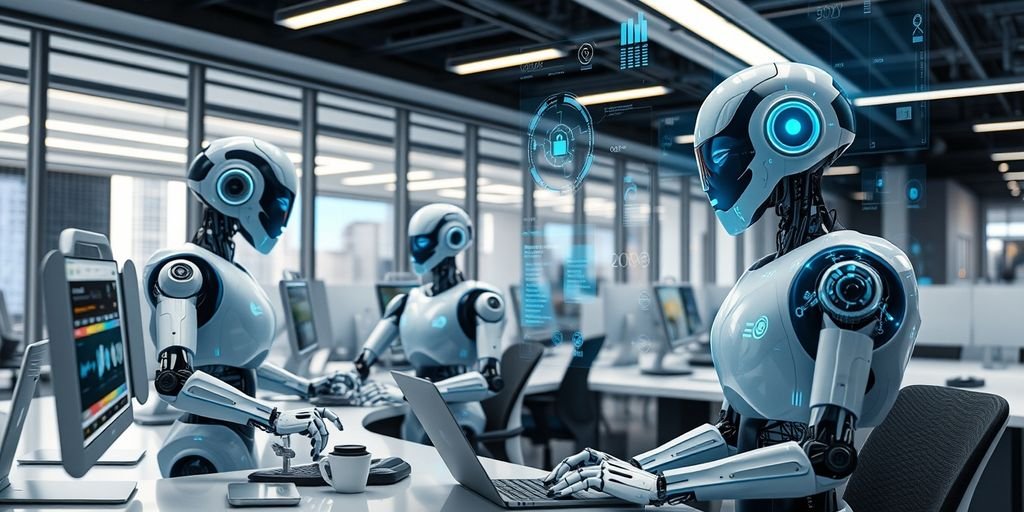In the ever-evolving landscape of software development, AI-powered tools have emerged as transformative agents, particularly in the realm of code generation. OpenAI Codex, a descendant of GPT-3, is at the forefront of this revolution, offering developers a versatile coding assistant capable of understanding and generating code across multiple programming languages. This article delves into the capabilities of OpenAI Codex, its integration into development workflows, and its impact on the industry, alongside a broader look at the burgeoning field of AI code generators, including Amazon CodeWhisperer and others.
Key Takeaways
- OpenAI Codex has significantly enhanced developer productivity by automating code generation and offering context-aware coding assistance across various programming languages.
- Integration of AI code generators like OpenAI Codex and Amazon CodeWhisperer into development workflows has streamlined software creation, reducing time and effort while maintaining high code quality.
- The future of coding jobs is influenced by AI, with tools such as GitHub Copilot suggesting a shift towards more creative and complex problem-solving roles for developers.
Harnessing the Power of OpenAI Codex in Modern Software Development
Understanding OpenAI Codex and Its Capabilities
OpenAI Codex has emerged as a transformative tool in the realm of software development, offering a coding assistant that can interpret natural language and convert it into executable code. Trained on a diverse corpus of programming languages, Codex excels in languages such as Python, JavaScript, and Ruby, among others.
The recent integration of Codex with GitHub Copilot has been a significant milestone, providing developers with intelligent code suggestions based on the context of their work. This collaboration has streamlined the coding process, enhancing developer productivity and efficiency.
Developers can also leverage OpenAI’s REST API-based services to incorporate the capabilities of language models like Codex into their own applications, further extending the utility of this AI-powered tool.
With its proficiency in multiple languages and its specialized focus, OpenAI Codex stands at the forefront of AI-assisted coding, reshaping how developers approach problem-solving and code generation.
Integrating OpenAI Codex into Your Development Workflow
The integration of OpenAI Codex into a developer’s workflow marks a significant advancement in coding efficiency and productivity. GitHub Copilot, a collaboration between Microsoft and OpenAI, exemplifies this by utilizing the Codex model to offer context-aware code suggestions. This tool not only accelerates the development process but also enhances the precision of code generation, allowing developers to focus on more complex tasks.
Incorporating OpenAI Codex into your workflow involves understanding its capabilities and limitations. It’s essential to recognize that while Codex can generate code in multiple languages, it requires clear and concise instructions to produce the best results. Here’s a simple guide to get started:
- Familiarize yourself with the Codex documentation.
- Start with small, non-critical projects to gain confidence.
- Gradually integrate Codex suggestions into larger codebases.
- Continuously review and refine the AI-generated code.
The synergy between AI and human developers is creating a new paradigm in software development, where the focus shifts from mundane coding tasks to strategic problem-solving.
As the technology evolves, it’s crucial to stay informed about the latest trends and updates. The recent surge in AI code generators has led to a plethora of tools, but OpenAI Codex remains a prominent figure due to its versatility and the breadth of its training data, which includes diverse code snippets and programming text from sources like GitHub and Stack Overflow.
Case Studies: Success Stories Using OpenAI Codex
The integration of OpenAI Codex into the software development process has led to a series of remarkable success stories. One such example is the case of Cloudester, a company that leveraged the power of custom AI to revolutionize its development process. By utilizing OpenAI’s advancements, Cloudester has seen a significant transformation in creating custom AI software, streamlining their workflow and enhancing productivity.
Another notable success is the synergy between OpenAI Codex and GitHub Copilot. This collaboration has empowered developers to translate code across different programming languages with ease, fostering a more collaborative and inclusive environment for developers worldwide. The ability to quickly understand and work with various languages has been a game-changer, particularly for teams with diverse technical backgrounds.
The synergy of OpenAI Codex with tools like GitHub Copilot exemplifies the potential of AI in augmenting human capabilities, rather than replacing them.
As we continue to witness the impact of AI on software development, it’s clear that these tools are not just about automation but also about enhancing the creative process of coding. They serve as intelligent assistants, providing insights and suggestions that can lead to more efficient and innovative solutions.
Exploring the Landscape of AI Code Generators Beyond OpenAI Codex
The Emergence of Amazon CodeWhisperer
In the rapidly evolving landscape of AI-powered code generation, Amazon CodeWhisperer has emerged as a significant player. This tool, designed to integrate seamlessly with popular IDEs such as JetBrains, Visual Studio Code, and AWS Cloud9, offers developers real-time code suggestions. Its ability to generate code snippets and functions from comments and existing code has made it a go-to solution for many developers seeking to enhance their productivity.
Amazon CodeWhisperer’s pricing model is tailored to cater to both individuals and teams, with a free tier for individual developers and a $19/month plan for teams. This accessibility has contributed to its growing popularity in the software development community.
Amazon CodeWhisperer’s recent updates have focused on improving its integration with infrastructure as code (IaC) tools like Terraform, enabling developers to generate IaC code automatically. This feature aligns with the current trend of DevOps and infrastructure automation, making it a relevant topic in the past three months.
Moreover, the experience of coding with CodeWhisperer’s assistance has been highlighted as transformative, particularly in the context of writing C# command line programs. The tool’s ability to understand the developer’s intent and provide accurate code suggestions has been a game-changer for many.
Comparing Top AI Code Generators of 2024
As we delve into the landscape of AI code generators in 2024, it’s evident that the field has seen significant advancements. The best AI code generators are not only enhancing coding efficiency but also reshaping the way developers approach problem-solving. A recent comparison of these tools reveals a diverse array of features tailored to different programming needs.
Key features to consider when selecting an AI code generator include its ability to integrate with various IDEs, support for multiple programming languages, and the quality of code suggestions. These features are crucial for a tool to adapt to a developer’s workflow and improve productivity.
The most effective AI code generators are those that align with your project’s requirements and personal coding style.
Here’s a quick overview of some of the top contenders:
- OpenAI Codex: Known for its versatility and integration with numerous IDEs.
- GitHub Copilot: Popular for its context-aware code suggestions.
- ChatGPT by OpenAI: Distinguished by its conversational interaction model.
- Replit GhostWriter: Recognized for helping programmers generate high-quality code efficiently.
In conclusion, while each AI code generator has its unique strengths, the ultimate choice depends on the specific needs of the developer and the project at hand. By carefully evaluating the key features and potential of each tool, developers can harness the full power of AI to transform their coding experience.
Assessing the Impact of AI on the Future of Coding Jobs
The growing impact of AI on the software development industry has sparked intense debate about the future of coding jobs. AI is not only revolutionizing the tools and processes but also raising questions about the role of human developers in an increasingly automated landscape. According to a team of researchers at the US Department of Energy’s Oak Ridge National Laboratory, there’s a high chance that AI will replace software roles that are repetitive and don’t require creative problem-solving.
However, this does not spell the end for software engineers. Instead, it highlights the need for a shift in focus towards skills that AI cannot easily replicate. As Forbes suggests, if coding isn’t the future, then what is? The answer lies in the unique human capabilities of creativity, complex problem-solving, and emotional intelligence. These are the areas where software engineers can continue to excel and remain relevant.
The demand for AI software developers has been skyrocketing recently, indicating a shift in the types of roles and skills that are in demand. This trend underscores the importance of adaptability and continuous learning in the tech industry.
AI’s profound impact on personalized developer support is also reshaping the job market. By offering customized learning paths and resources, AI enables developers to quickly improve their skills and adapt to new challenges. This not only makes the development process more efficient but also opens up new opportunities for those willing to embrace the change.
Embracing the Future of Code Generation
As we have explored throughout this article, AI-powered code generation tools like OpenAI Codex are revolutionizing the landscape of software development. By automating routine coding tasks, offering intelligent code suggestions, and integrating seamlessly with popular development environments, these tools are not just enhancing productivity but also reshaping the role of developers. The ability to generate high-quality code with minimal errors and in a fraction of the time it would traditionally take is a testament to the power of AI in the tech industry. While concerns about AI replacing human jobs persist, it’s clear that these tools are meant to augment human capabilities, not replace them. As we move forward, embracing these advancements will be key to staying competitive and innovative in the ever-evolving field of software development.
Frequently Asked Questions
What is OpenAI Codex and how does it transform software development?
OpenAI Codex is an AI model that understands and generates code across multiple programming languages. It acts like a coding assistant, automating code suggestions and completing functions, which streamlines workflow, minimizes errors, and enhances productivity in software development.
How does GitHub Copilot utilize OpenAI Codex to improve coding?
GitHub Copilot is an AI-powered coding assistant developed by GitHub and OpenAI. It integrates with IDEs like Visual Studio Code to provide context-aware code suggestions, leveraging the power of OpenAI Codex and vast code repositories from GitHub to accelerate and refine the coding process.
Will AI code generators like OpenAI Codex replace software developers?
While AI code generators significantly enhance coding efficiency and quality, they are not intended to replace software developers. Instead, they serve as tools to assist developers by automating repetitive tasks, allowing them to focus on more complex and creative aspects of software development.



